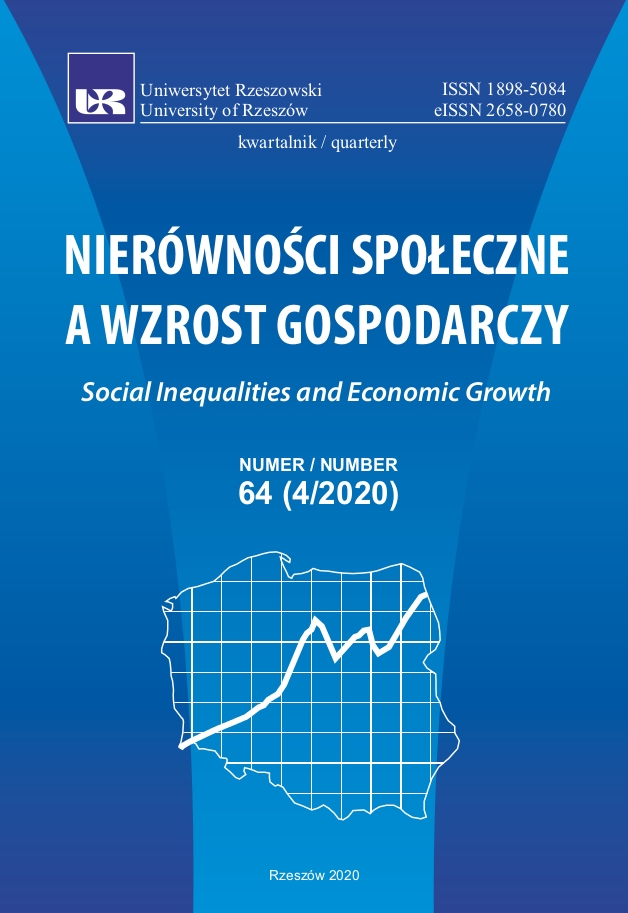Geopolitical conditions of competition for Arctic resources
DOI:
https://doi.org/10.15584/nsawg.2020.4.19Keywords:
Arctic, natural resources, tragedy of the commons, economic development, maritime transportAbstract
The aim of the study is to indicate the usefulness of game theory in the context of the effectiveness of geopolitical problem analysis in terms of improving decision-making in relation to Arctic areas. The article presents a series of significant global Arctic problems related to open fisheries, opening Arctic areas for the extraction of natural resources or creating new and more favorable sea routes for transporting goods. Key players in the Arctic area have been identified along with their conflicting claims. It was mentioned that cooperation leads to a reduction in social costs and the stimulation of economic development in the main areas of interest for individual countries. To verify the assumptions, an experiment based on a tragedy of the commons was carried out, in which the participants took the role of fisher-hunters and mining companies. The experiment took the form of a dynamic game, where in each round the participants decided on the volume of catches and resources extracted. The results showed that limiting the freedom of action extended the time of the game, and thus the functioning of the entities and the duration of resources. Leaving plenty of capacity led to agreement between the players and the self-introduction of limits. The experiment showed that the players were aware that only agreement led to gaining benefits in the long term. Thus the creation of an institution supervising disputed areas can lead to conflict mitigation, where entities with different goals and interests must reach agreement, especially when the key challenge is to avoid degradation of the resources and the environment.
Downloads
References
Arnasson, R., Magnusson, G., Agnarsson, S. (2010). The Norwegian spring-spawning herring fishery: a stylized game model. Marine Resource Economics, 15, 193–319. DOI: 10.1086/mre.15.4.42629328.
Chrastansky, F., Kriz, Z. (2011). Perception of the situation in the arctic by key actors and the possibility of conflict escalation. Defense & Strategy, 11(1), 5–21. DOI: 10.3849/1802-7199.11.2011.01.005-021.
Clark, C. W. (1990). Mathematical bioeconomics: the optimal management of renewable resources. New York: Wiley-Interscience.
Cole, S., Izmalkov, S., Sjoberg, E. (2014). Games in the Arctic: applying game theory insights to Arctic challenges. Polar Research, 33(1), 1–14. DOI: 10.3402/polar.v33.23357.
Ebinger, C., Zambetakis, E. (2009). The geopolitics of Arctic Melt. International Affairs, 85(6), 1215–1232. DOI: 10.1111/j.1468-2346.2009.00858.x.
Egorov, N., Pospelova, T., Yarygina, A., Klochkova, E. (2019). The Assessment of Innovation Development in the Arctic Regions of Russia Based on the Triple Helix Model. Resources, 8(72), 1–13. DOI: 10.3390/resources8020072.
Gautier, D. L., Bird, K. J., Charpentier, R. R., Grantz, A., Houseknecht, D. W., Klett, T. R., Moore, T. E., Pitman, J. K., Schenk, C. J., Schuenemeyer, J. H., Sorensen, K., Tennyson, M. E., Valin, Z. C., Wandrey, C. J. (2009). Assessment of undiscovered oil and gas in the arctic. Science, 324(5931), 1175–1179. DOI: 10.1126/science.1169467.
Hardin, G. (1968). The tragedy of the commons. Science, 162, 1243–1248. DOI: 10.1126/ science.162.3859.1243.
Honneland, G. (2007). Norway and Russia in the Barents Sea: cooperation and conflict in fisheries management. Russian Analytical Digest, 20, 9–11.
Janicki, W. (2013). Rywalizacja w Arktyce: przesłanki polityczne czy gospodarcze? W: M. Łuszczuk (red.), Arktyka na początku XXI wieku. Między współpracą a rywaliza¬cją (s. 9–18). Lublin: Wydawnictwo UMCS.
Jaworski, K. (2009). Prospects for growth of international shipping in Arctic region – implications for the European Union. Warszawa: Office of the Committee for European Integration.
Kennedy, J. O. S. (2003). Scope for efficient multinational exploitation of north-east Atlantic mackerel. Marine Resource Economics, 18, 55–80. DOI: 10.1086/mre. 18.1.42629383.
Kijewski, T. (2009). Rywalizacja o surowce energetyczne w Arktyce. Bezpieczeństwo Narodowe, 9(10), 272–288.
Konnikov, E. A., Konnikova, O. A., Rodionov, D. G. (2019). Impact of 3D-Printing Technologies on the Transformation of Industrial Production in the Arctic Zone. Resources, 8(1), 1–15. DOI: 10.3390/resources8010020.
Konyukhovskiy, P., Holodkova, V., Titov, A. (2019). Modeling competition between countries in the development of Arctic resources. Resources, 8(1), 49, 1–17. DOI: 10.3390/resources8010049.
Ljovkina, A. O., Dusseault, D. L., Zaharova O.V., Klochkov, Y. (2019). Managing Innovation Resources in Accordance with Sustainable Development Ethics: Typological Analysis. Resources, 8(2), 82, 1–17. DOI: 10.3390/resources8020082.
Macnab, R., Dahl-Jensen, T., Sorensen, K. (2007). Establishing rights over the Arctic Ocean. Science, 316(5828), 1122–1123. DOI: 10.1126/science.316.5828.1122c.
Matthíasson, T. (2003). Closing the open sea: development of fishery management in four Icelandic fisheries. Natural Resources Forum, 27(1), 1–18. DOI: 10.1111/1469-8219.00065-i1.
Myers, R. A., Hutchings, J. A., Barrowman, N. J. (1997). Why do fish stocks collapse? The example of cod in Atlantic Canada. Ecological Applications, 7(1), 91–106. DOI: 10.1890/1051-0761.
Ostrom, E. (2009). A general framework for analyzing sustainability of social-ecological systems. Science, 325(5939), 419–422. DOI: 10.1126/science.1172133.
Parlee, B., Furgal, C. (2012). Well-being and environmental change in the Arctic: a synthesis of selected research from Canada’s International Polar Year Program. Climate Change, 115(1), 13–34. DOI: 10.1007/s10584-012-0588-0.
Poletskov, P., Gushchina, M., Polyakova, M., Alekseev, D., Nikitenko, O., Chukin, D., Vasilev, Y. (2019). Development of Alloyed Pipe Steel Composition for Oil and Gas Production in the Arctic Region. Resources, 8(67), 1–11. DOI: 10.3390/resources8020067.
Potts, T., Schofield, C. (2009). The Arctic: a race for resources or sustainable ocean development. Ocean Challenge, 16(3), 23–33.
Shephard, G. E., Dalen, K., Peldszus, R., Aparício, S., Beumer, L., Birkeland, R., Gkikas, N., Kourantidou, M., Ktenas, P., Linde, P. W., Marazzi, F., Pincinato, R. B. M., Radianti, J., Schartmüller, B., Stübner, E. I., Varnajot, A., Vullierme, M., Zhilina, I. (2016). As¬sessing the added value of the recent declaration on unregulated fishing for sustainable governance of the central Arctic Oceans. Marine Policy, 66, 50–57. DOI: 10.1016/j.mar-pol.2016.01.013.
Vermeij, G., Roopnarine, P. D. (2008). The coming Arctic Invasion. Science, 321(5890), 780–781. DOI: 10.1126/science.1160852.
Downloads
Published
How to Cite
Issue
Section
License
Copyright (c) 2020 University of Rzeszow

This work is licensed under a Creative Commons Attribution-ShareAlike 4.0 International License.


